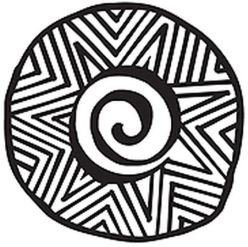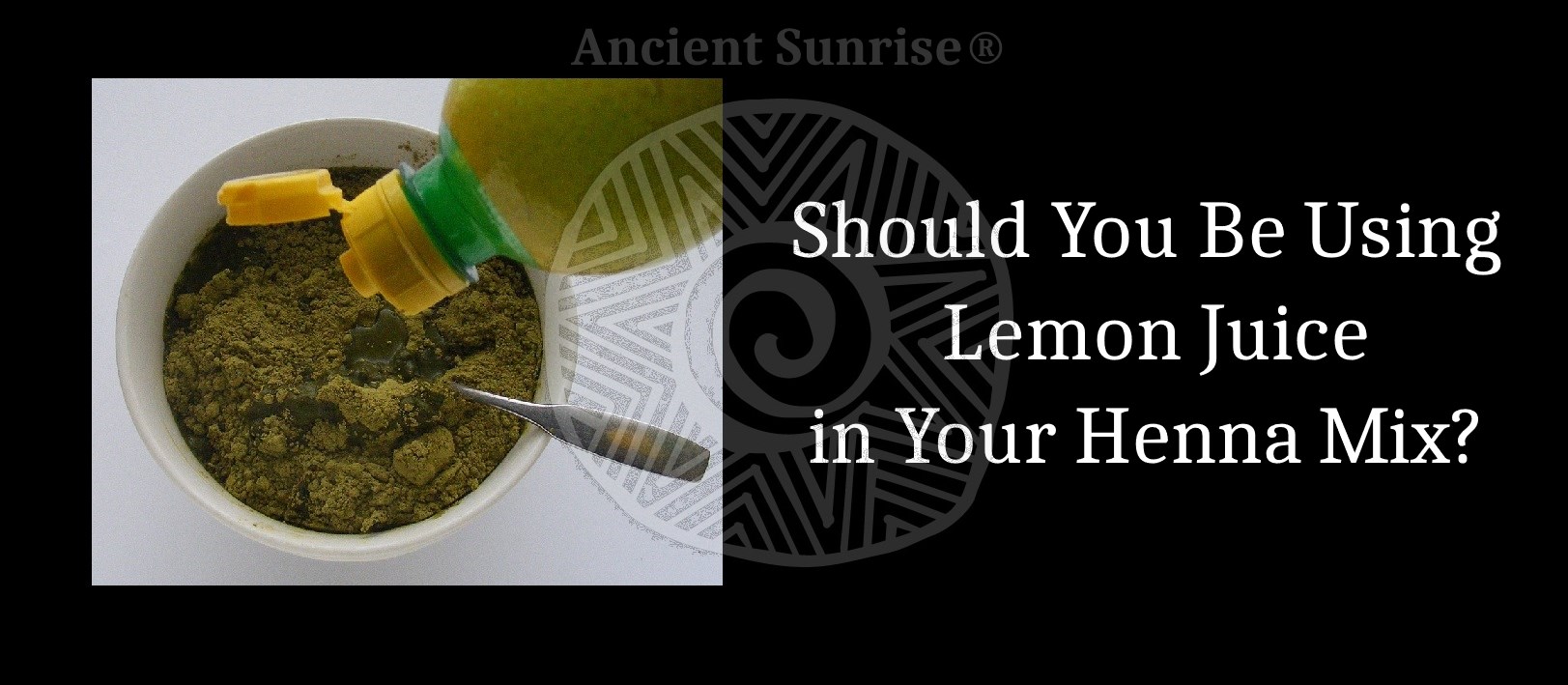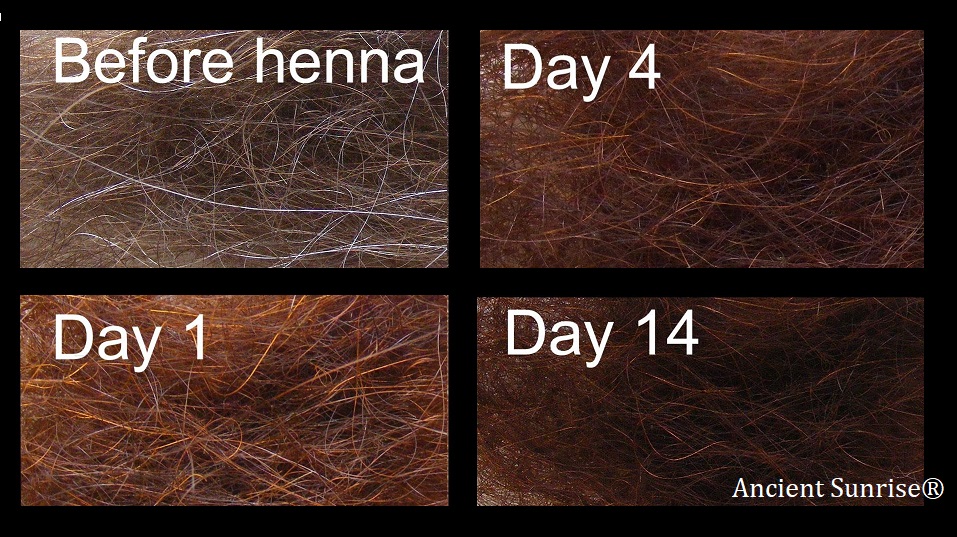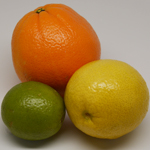Lemon juice is very commonly used as the acidic liquid for dye-releasing henna. It is cheap, easy to find, and definitely acidic enough for a good dye release. Many people swear by it, but just as many say that they can’t use it. This is because lemon juice can be drying and irritating for many.
In fact, whenever someone asks why their scalp is itching after a henna application, my first question automatically is, “What did you mix it with?” and 90% of the time, the answer is lemon juice. Later, the customer is thrilled to find that, after switching to another acid, they never experience that problem again.
Lemon juice is also often the culprit behind hennaed hair that became darker than desired. A lemon juice mix yields bright orange tones at first, but the stain oxidizes very dark over time.
This is not to say that lemon juice is unsuitable for henna mixes, or that it should be avoided at all costs; for many people, it is just fine. In fact, I use it most of the time in my own mixes. I am not particularly sensitive to it, and the results work for my needs. For others, however, some discomfort or unwanted results can be avoided by choosing a different acid
If you use lemon juice in your henna mix, or are considering trying it, this article will cover a few things you may want to be aware of. You can then decide whether you would rather use a different acidic liquid or powder.
Note on Lime Juice: All of the following applies the same, and more so, to limes and lime juice. Limes are much harsher, and more likely to cause irritation and photo-sensitivity than lemons. Honestly, just don’t use lime juice. If your heart is set on limes, dilute it generously.
Lemon Juice May Lead to Irritated Skin and Dry-Feeling Hair
As mentioned earlier, lemon juice is a very common cause of itchy scalps post-hennaing. Some people are initially alarmed, and misinterpret this as an allergic reaction to the henna product. While henna allergies do happen, they are extremely rare. Citrus sensitivity, on the other hand, is much more common. To learn more about allergies in relation to plant dye powders, click here.
The low pH of undiluted lemon juice can bother the skin, especially for those with sensitive skin, and especially when henna paste is left on for several hours. The result is dry, irritated skin and rough-feeling hair. The crunchy texture in the hair is temporary, as the cuticles on the hair shaft are raised after a henna treatment, and will settle down in the following days. Cold water and conditioner can help the hair become smooth more quickly.
A henna mix does not need to be extremely acidic in order to achieve dye release. A pH of 4.5 is sufficient. Lemon juice has a pH of 2.3. Consider diluting lemon juice with three or four parts distilled water. Milder juices like apple and cranberry work just as well without needing to be diluted. Ancient Sunrise® offers several fruit acid powders to suit a variety of hair types and needs. Know that each fruit juice or acid powder may yield different effects on the resulting color. Click here for more information on henna and acidic mixes.
Hair may feel rough after henna because dye molecules are settling into place. A very acidic mixture, such as one with undiluted lemon juice, may make this feeling more noticeable.
Lemon Juice Will Make Hennaed Hair Darker, Not Lighter
Lemon juice is a popular way subtly bleach the hair. For those with lighter hair colors, spritzing the hair with lemon juice prior to going out into the sun can bring out highlights. One can also find endless DIY hair treatments involving lemon juice and claiming to lighten hair.
However, using lemon juice in a henna mix has the opposite effect. Lemon juice mixes result in vivid, fiery results at first, but the color is known to oxidize to darker and darker shades over time. I’ve spoken to many people who loved their hennaed hair color at first, but found that it got much too dark over time. The most common mistakes, often used in conjunction, were a) using lemon juice; b) reapplying henna to the entire length of the hair; c) reapplying too often, and d) using heated styling tools. To learn about other causes of darkening and how to prevent it, read this article.
Highly acidic mixes will continue to oxidize after the initial couple of weeks, leading to increasingly dark results after several months or years.
As a rule of thumb, very low pH liquids will all do a similar thing with henna: Initial stains will be noticeably bright, and then the color will deepen continually over time. The more acidic the mix, the greater the difference between first rinse and final oxidation. Many people who use lemon juice may only be aware of the first part, and then later become upset that their hair no longer has that vivid brightness that it once did when they just began using henna. Additionally, the only effective way to lighten hennaed hair is to bleach it.
For a brighter, lighter result that does not oxidize, Ancient Sunrise® Copperberry fruit acid powder works really well. It is high in antioxidants that keep darkening at bay. Ancient Sunrise® Kristalovino fruit acid powder also causes brighter results, and is very gentle on sensitive skin.
Some people (including me), are fully aware that lemon juice causes darker results over time, and use it for that purpose. But to be honest, there are much faster ways to push henna to a deep red without having to wait through the bright orange period. Ancient Sunrise® Malluma Kristalovino fruit acid powder creates deep auburn results and is very gentle on the skin. Ancient Sunrise® Nightfall Rose powder is high in anthocyanins, which gives a cooler tone to henna.
Henna does not fade over time. It darkens. Highly acidic mixes will darken more over time. Mixes that are high in antioxidants can prevent darkening.
Citrus Can Cause Photo-sensitivity
Citrus oils are phototoxic. They make the skin more sensitive to sunlight. This can result in sunburns in situations when one would not normally expect to be burned. Especially in the case of fresh-squeezed lemon juice, you may inadvertently cause photo-sensitivity to your scalp by using a henna mix with lemon juice. This is definitely the case with lime juice. You may have heard of people suffering reactions after getting a bit of margarita on themselves while enjoying the sun. This does happen.
On the other hand, henna has some great natural UV protective qualities, and your hair will provide some barrier between your scalp and the sun. In any case, if you have particularly photosensitive skin, or are sensitive to citrus juices and oils, you may want to consider using a different fruit acid.
What To Use Instead
Lemon juice will always be a staple in the henna world, but it’s always good to have options. As I mentioned before, there are numerous other fruit juices and fruit acid powders which will work just as well, or better, than lemon juice.
If you’re set on using lemon, consider diluting it. Full-strength lemon juice is more acidic than what is necessary to dye-release henna. As long as the liquid tastes mildly tart, it will work. Diluting also makes your bottle of lemon juice last longer, or saves you from having to squeeze several pounds of lemons.
If you are experiencing an irritated scalp, try one of the Kristalovino fruit acids, or apple juice. Ancient Sunrise® Malluma Kristalovino is the gentlest of all of the Ancient Sunrise® fruit acid powders, and makes henna shades darker for rich auburn and brunette shades. Ancient Sunrise® Kristalovino is the second gentlest, and leaves results light and bright. Apple juice is mild, and will result in a tone that is neither too light nor dark, but can be sticky and make your mix smell boozy.
If you are looking for bright, coppery or fiery tones that stay bright over time, try Ancient Sunrise® Copperberry fruit acid powder, or pure cranberry juice. Both are high in antioxidants that prevent the henna color from darkening over time. If you opt for cranberry juice, make sure to get the real thing—many are a mixture of other juices, water, sugar, and some cranberry juice. 100% pure cranberry juice can be expensive, though.
Final Notes
Lemon juice is a great mixing liquid for some people; for others, it can cause issues. Be aware of this if you are new to mixing henna, or if you are mixing henna for someone else. If you are experiencing an itchy, irritated scalp, or if you notice that your hair color is getting too dark over time, consider using a different dye-release acid. You will very likely find that lemon juice is the culprit. Again, the same goes for lime, which is even more acidic and phototoxic than lemon. Lemon juice at full strength can be tolerated by some. Lime juice should always be diluted, and better yet, avoided.
If you have any questions about what acidic medium to use in your henna mix, feel free to comment below or contact Customer Service at www.Mehandi.com.
Author Rebecca Chou May 2018
Edited Maria Moore November 2022




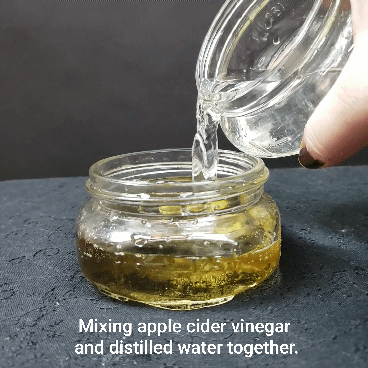
 Liz • Ancient Sunrise® Specialist
Liz • Ancient Sunrise® Specialist